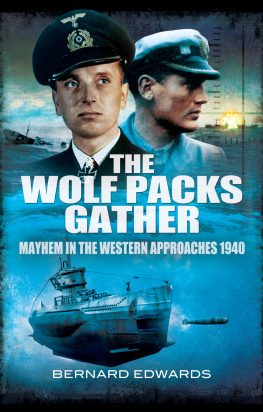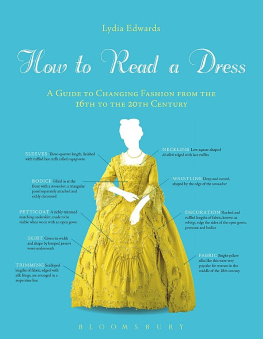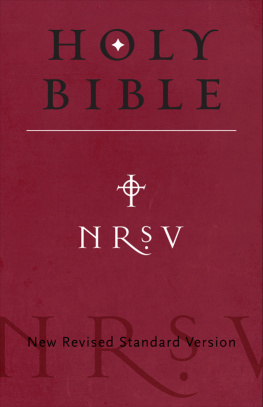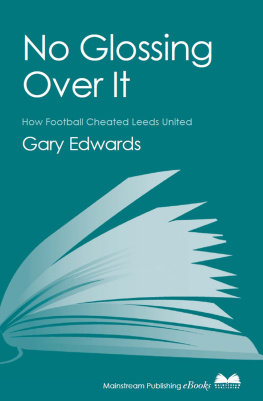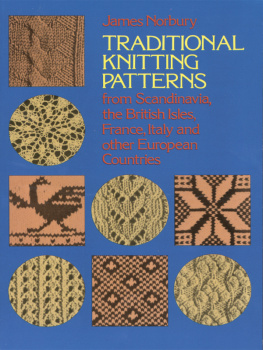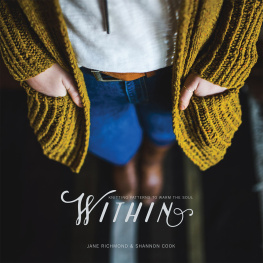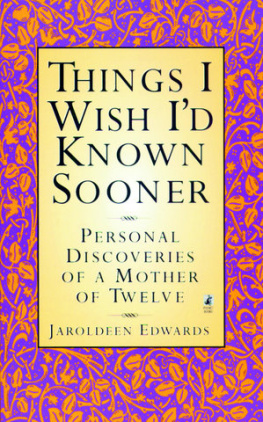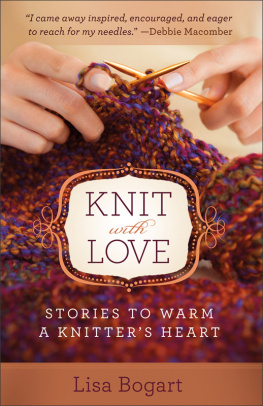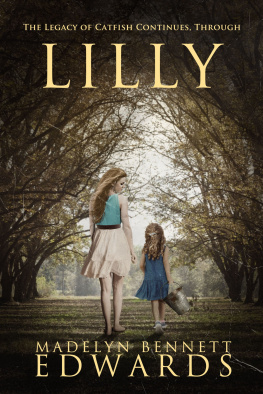

Published in 2011 by Stewart, Tabori & Chang
An imprint of ABRAMS
Text and illustrations copyright
Michelle Edwards
Photographs copyright 2011 Jen Gotch
Versions of Only Wool and Lillian Edwards have appeared in Lion Brand Yarns e-newsletter.
All rights reserved. No portion of this book may be reproduced, stored in a retrieval system, or transmitted in any form or by any means, mechanical, electronic, photocopying, recording, or otherwise, without written permission from the publisher.
Library of Congress Cataloging in Publication Division
Edwards, Michelle.
A knitters home companion / Michelle Edwards; photographs by Jen Gotch.
p. cm.
ISBN 978-1-58479-916-0 (alk. paper)
1. Knitting--Patterns. 2. Knitting--Miscellanea. I. Title.
TT820.E47 2011
746.432--dc22
2010020942
Editor: Melanie Falick
Technical Editor: Sue McCain
Designer: onethread
Production Manager: Tina Cameron
The text of this book was composed in Gotham and Archer.
Stewart, Tabori & Chang books are available at special discounts when purchased in quantity for premiums and promotions as well as fundraising or educational use. Special editions can also be created to specification. For details, contact specialsales@abramsbooks.com or the address below.

www.abramsbooks.com


CONTENTS
INTRODUCTION:
WELCOME
CHAPTER 1:
MOTHERHOOD
CHAPTER 2:
HOME
CHAPTER 3:
COMMUNITY
CHAPTER 4:
LEGACY

| 
|
PROJECTS | RECIPES |
E ventually, I gave up. My husband, Rody, loves languages and learning new things. Hes interested in a wide range of topics. But as hard as I have tried, knitting has not become one of them.
My daughters, Meera, Flory, and Lelia, are a little better. When a new knitting magazine arrives in the mail, I can usually corral one of them into looking through it with me, asking them to weigh in on what they like most or least. Lately they are a bit more willing to indulge me, interested in snagging a pair of hand-knitted socks or wristersoccasionally, a sweater. None of them show any sustained inclination to pick up the needles and make something for themselves, orsighme. And although I love them dearly, they have not grown into knitting buddies.
These days if I need to blab about a great new yarn or find a sympathetic ear for complaints about a sweater that refuses to be finished, I talk to other knitters. I e-mail one. I head down for a cup of tea at the Home Ec Workshop, which knitters in my town are known to frequent. If its a Saturday and Im not needed on the home front, Ill join the Fae Ridge Knitters on Janette Ryan-Buschs organic farm out on Rapid Creek Road. Or I start an essay for my monthly gig with the Lion Brand Yarn Company e-newsletter.
Knitting is like belonging to a tribe complete with initiation rituals, customs, rites of passage, and language. After knitting awhile, you acquire strong opinions about thumbs, gussets, and heels. And when you have been knitting for a long time, like I have, knitting shapes your worldview. Reading a picture book about a chair a family buys for the mother, I think about the chair I knit in. The main character in a movie appears in a handmade hat, and I stray from the plot, lost in the hats cables. Given an afghan made by an aunt I never really knew, I translate its colors, size, and pattern and discover a kindred spirit. Story ideas percolate when I knit socks for a friend, unfold the baby blanket I made my firstborn, or untangle a skein of yarn.
Knitting is not just a metaphor. Knitting is a life. And because my knitting flows into what I draw and write, what I cook, and what I read, this illustrated gathering of my stories is connected to recipes, patterns, and books. Let it keep you company when you need another knitters voice beside you. Stick it in your knitting bag, and pull it out when you are waiting in a doctors office. Use it to help you through a lonely momentwhen youre away from your knitting group, when your favorite yarn store is closed, or when its too late to call your best buddy in New York Cityor China.
Welcome to A Knitters Home Companion. Thanks for stopping by.

R ody and I were married on a cold November eveningtoo cold to wear just my wedding dress and the shawl I had made, but thats all I wore anyway. The new shawl was my stretch to meet the bridal tradition of something old, something new, something borrowed, something blue. The wool was pale rose, not blue, but the pattern was borrowed from a shawl belonging to my friend and mentor, Isabel Nirenberg. And the something old was the tradition of the handmade passed on to me from my mother, who taught me to knit. She had died less than a year before, a decade after my fathers death. Rodys parents were also deceased. We were on our own.
We planned for our wedding to take place where we lived together, in Iowa City, a Big Ten university town. We made double sure that our chosen date wasnt during a home football game weekend. We reserved a block of hotel rooms for our out-of-town guests, and the Hillel House, the Jewish student center where I worked, for the wedding. We hired a band and a caterer for the reception. Mr. Rubinstein, the cantor who had prepared Rody and his brother, Myron, for their bar mitzvahs, flew in to help with the ceremony.
We exchanged our vows in front of a gathering of family and neighbors, old friends and new ones. Later, while the band played, the same group cheered and clapped as the crew of Iranian students I had invited seated us in chairs and lifted us up for a traditional marriage dance. My handmade shawl, tossed aside during the nights warmth and excitement, felt perfect back on my shoulders as Rody and I, husband and wife, stepped out into the cold again.
Our honeymoon was to be a few weeks later. We had found a great package deal to Denmark between Christmas and New Years. The day we were to leave, the Maharishi University in Fairfield, Iowa, about an hour and a half south of our house, orchestrated a worldwide meditation to generate world peace. Sadly, instead of global harmony, Iowa was hit by a temperature freeze so spectacular that our plane was unable to fuel up. As we waited to check our luggage, all flights out were canceled. It was neither practical, nor possible, to catch up with our connection in Chicago by car.
Next page

